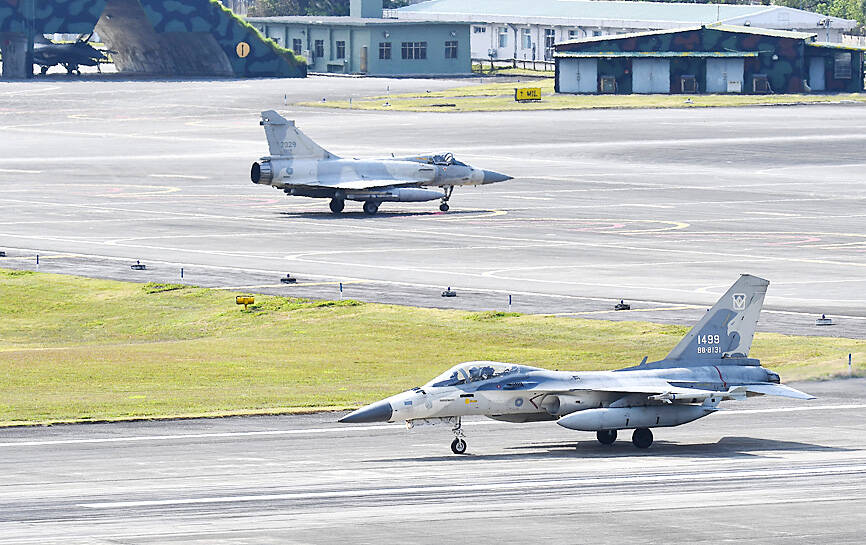Pilots of F-16V, Mirage 2000 and other jets have been participating in joint training at Hualien County’s Chiashan Air Force Base to bolster the military’s ability to engage in asymmetric warfare, military officials said yesterday.
Lieutenant General Sun Lien-sheng (孫連勝), deputy commander of the Air Force Command, said at the launch of the joint training earlier this month that such exercises would be held more frequently to gain an understanding of the limitations and capabilities of different military branches, and to determine what support they need to closely work with one another during wartime.
The goal is to enable Taiwan’s relatively smaller military to deter China from invading, Sun added.

Photo: Yu Tai-lang, Taipei Times
Military officials yesterday said that the lesson from Russia’s war in Ukraine is to build an asymmetric military force to stall, destroy or paralyze the enemy.
The air force is mostly asked to support other military branches’ missions, so joint training must first start with combat precision training for the air force, and then expand to include the other two branches of the military, they said.
To improve training for second-generation aircraft, the air force in 2001 commissioned the Chungshan Institute of Science and Technology to develop the Tactic Analysis System (TAS), which was merged with the existing telemetry system.
TAS was modified and refined based on actual air force operations. It includes a mission display and control system, an airborne targeting pod and relay stations.
The TAS system has been upgraded to be used with the Air Combat Training Instrumentation System (ACTIS) targeting pod for military exercises, the officials said.
Aside from F-16Vs, Mirage 2000s and Indigenous Defense Fighters, Taiwan’s AIDC T-5 Brave Eagle trainer jet has also been equipped with the ACTIS targeting pod, they said.
The Brave Eagle’s test missions now include air-to-surface bombing, the officials added.
In other developments, the Ministry of National Defense last month began expanding the number of reservists nationwide, military personnel said.
New reserve brigades have been formed in Taichung, Kaohsiung, New Taipei City and Hsinchu County, they said.
A reserve brigade now consists of nearly 200 personnel, up from 24 under the previous policy, they said, adding that brigade commanders, battalion commanders and other important staff are on active duty.
The ministry is expected to form four more reserve brigades in the second half of this year and another 10 next year, military sources said.
Chen Wen-jia (陳文甲), a senior consultant for the Institute for National Policy Research, said that having reserve brigades in 18 cities and counties would help mobilize reservists, but “regulations governing the mobilization of reservists must be flexible.”
Su Tzu-yun (蘇紫雲), a research fellow at the government-funded Institute for National Defense and Security Research, said rules related to reservists are expected to be greatly improved.

NATIONAL SECURITY THREAT: An official said that Guan Guan’s comments had gone beyond the threshold of free speech, as she advocated for the destruction of the ROC China-born media influencer Guan Guan’s (關關) residency permit has been revoked for repeatedly posting pro-China content that threatens national security, the National Immigration Agency said yesterday. Guan Guan has said many controversial things in her videos posted to Douyin (抖音), including “the red flag will soon be painted all over Taiwan” and “Taiwan is an inseparable part of China,” while expressing hope for expedited “reunification.” The agency received multiple reports alleging that Guan Guan had advocated for armed reunification last year. After investigating, the agency last month issued a notice requiring her to appear and account for her actions. Guan Guan appeared as required,

A strong cold air mass is expected to arrive tonight, bringing a change in weather and a drop in temperature, the Central Weather Administration (CWA) said. The coldest time would be early on Thursday morning, with temperatures in some areas dipping as low as 8°C, it said. Daytime highs yesterday were 22°C to 24°C in northern and eastern Taiwan, and about 25°C to 28°C in the central and southern regions, it said. However, nighttime lows would dip to about 15°C to 16°C in central and northern Taiwan as well as the northeast, and 17°C to 19°C elsewhere, it said. Tropical Storm Nokaen, currently

PAPERS, PLEASE: The gang exploited the high value of the passports, selling them at inflated prices to Chinese buyers, who would treat them as ‘invisibility cloaks’ The Yilan District Court has handed four members of a syndicate prison terms ranging from one year and two months to two years and two months for their involvement in a scheme to purchase Taiwanese passports and resell them abroad at a massive markup. A Chinese human smuggling syndicate purchased Taiwanese passports through local criminal networks, exploiting the passports’ visa-free travel privileges to turn a profit of more than 20 times the original price, the court said. Such criminal organizations enable people to impersonate Taiwanese when entering and exiting Taiwan and other countries, undermining social order and the credibility of the nation’s

‘NATO-PLUS’: ‘Our strategic partners in the Indo-Pacific are facing increasing aggression by the Chinese Communist Party,’ US Representative Rob Wittman said The US House of Representatives on Monday released its version of the Consolidated Appropriations Act, which includes US$1.15 billion to support security cooperation with Taiwan. The omnibus act, covering US$1.2 trillion of spending, allocates US$1 billion for the Taiwan Security Cooperation Initiative, as well as US$150 million for the replacement of defense articles and reimbursement of defense services provided to Taiwan. The fund allocations were based on the US National Defense Authorization Act for fiscal 2026 that was passed by the US Congress last month and authorized up to US$1 billion to the US Defense Security Cooperation Agency in support of the